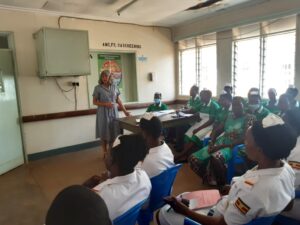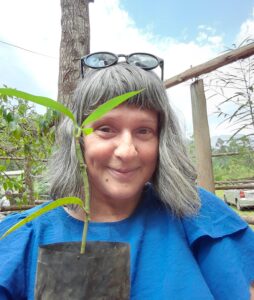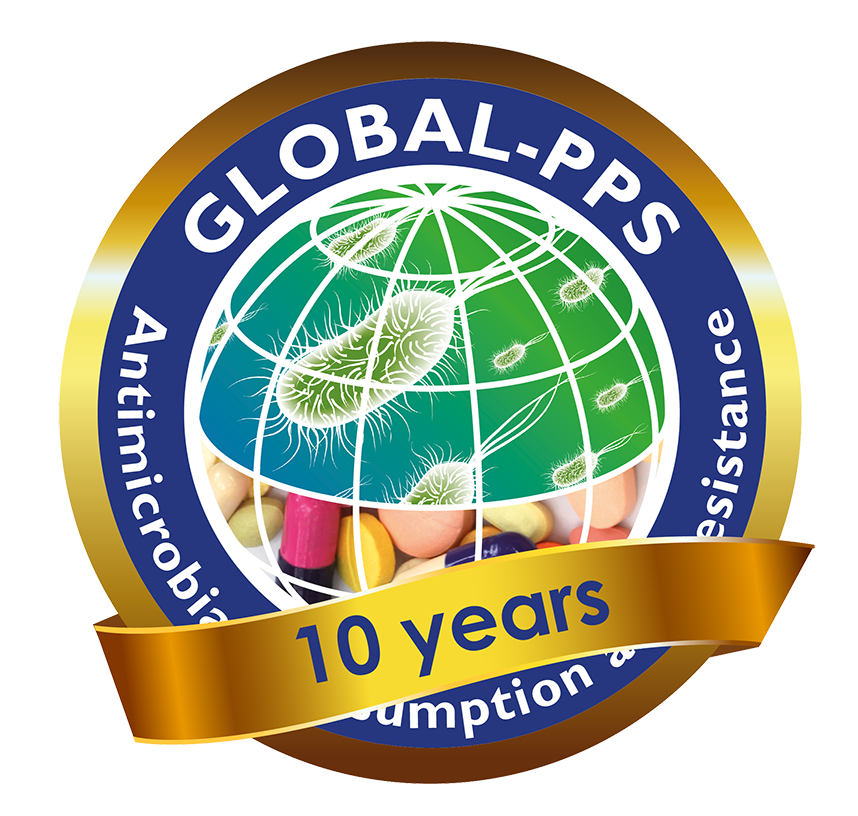Connecting Wales and Uganda: interview with Amanda Daniel
Read our interview with Amanda Daniel, Lead Nurse and IPC Specialist from Wales who worked in a Ugandan hospital to help identify antimicrobial prescribing rates. The implementation of the Global-PPS in Uganda highlighted both the challenges and opportunities in addressing AMR and improving infection prevention and control practices.
 Can you introduce yourself and elaborate your work?
Can you introduce yourself and elaborate your work?
Amanda Daniel: My current role involves leading the Infection Prevention and Control for Community and Primary Care as part of the Health Care Associated Infection, Antimicrobial Resistance and Prescribing Programme of Public Health Wales (HARP), addressing healthcare-associated infections and antimicrobial resistance.
Recently, I had the opportunity to work in a hospital in Kumi, Eastern Uganda in the context of an ILO, an International Learning Opportunity which is funded by the Welsh government. The ILO enables staff to work on projects aligned with the UN Sustainable Development Goals. I was matched with the T4U-Organisation (Teams for you) who operate a water, sanitation and hygiene programme in Uganda.
What does the capacity building project from Public Health Wales entail?
Amanda Daniel: Public Health Wales (PHW) has an international coordination team. The primary goal of PHW’s international health strategy is to foster a globally interconnected and inspiring public health organisation. Central to this strategy is the support for global health workforce development and capacity building, which encompasses a range of e-learning resources, including those focused on global citizenship.
How is the situation regarding AMR in Uganda?
Amanda Daniel: Uganda faces a significant challenge with antibiotic resistance, as highlighted by the national action plan spanning from 2018 to 2023. There’s a concerning trend of increasing resistance to common antibiotics like penicillin and cotrimoxazole, alongside rising rates of resistant bacteria such as MRSA and ESBLs. However, during my stay, there was a lack of comprehensive data on infection prevalence and antibiotic usage in healthcare facilities, leading to empirical prescribing practices.
When and how did you start your collaboration with the Global Point Prevalence Survey?
Amanda Daniel: I was looking for an easy-to-use tool for registering and repeating interventions, with the added requirement of producing quick turnaround reports within eight weeks. In February 2023, the Commonwealth Pharmacists Association connected me with Global-PPS. With Global-PPS’s assistance, despite the tight timeline, we received valuable advice on focusing our efforts, opting to assess a subset of medical wards, mixed surgery, and obstetrics while excluding paediatrics, community, and outpatient areas. This proposal gained acceptance and support from the IPC committee, medical supervisor, and district health officer, which led to the allocation of staff and the formation of a team.
What are the concrete advantages of a Global-PPS for the Ugandan hospital? How did you use the results?
Amanda Daniel: First of all, we gained invaluable insights into antibiotic usage patterns and guideline compliance within the hospital. It allowed us to identify areas for improvement. Secondly, the real-time feedback and support from the Global-PPS team facilitated rapid data collection and analysis, enabling us to make informed decisions and develop targeted interventions. The data from the report was easily transferable into a presentation which we presented at numerous occasions, for example to the District Health Officer and medical superintendent.
What were the most important areas for improvement identified from the Global-PPS results?
Amanda Daniel: We observed low compliance with antibiotic prescribing guidelines, inadequate documentation, and suboptimal review practices. Compliance with antimicrobial guidelines was notably low in surgical notes at 26.7%, while medical notes showed higher adherence at 61-62%. Despite the availability of Ugandan clinical guidelines, we saw high prescribing rates of broad-spectrum antibiotics. By addressing these issues, we aimed to enhance patient safety, reduce unnecessary antibiotic usage, and mitigate the risk of antibiotic resistance development.
Did you implement any antimicrobial stewardship (AMS) activities to address some of these issues? Which ones?
Amanda Daniel: Yes, following the Global-PPS findings, we discussed internal stewardship efforts aimed at improving antibiotic prescribing practices and enhancing infection prevention measures. We set up an antimicrobial stewardship committee, with the aim of developing prescribing policies, and provide training on antibiotic stewardship principles. We also focused on improving documentation standards and promoting interprofessional collaboration to ensure effective antibiotic use and patient care. Special attention was given to the high number of neonates on antibiotics. To address this urgent issue, the team at hospital decided to increase midwife support. Treatment protocols were adopted from the nearby Mbale regional referral neonatal unit and two midwives from that institution gave medical training to the maternity team on the best treatment protocol for neonates.
What are the main challenges of using Global-PPS and what can be improved?
Amanda Daniel: We encountered challenges related to time constraints, internet connectivity, and staff capacity. Limited resources and competing priorities posed barriers to data entry and sustained implementation of stewardship initiatives. But still, we gathered helpful suggestions from Global-PPS, such as ensuring ward awareness, access to patient notes, and avoiding peak busy hours. Implementing these recommendations added efficiency to our two-day assessment of the selected wards, although the process took longer than anticipated. These logistical insights proved invaluable, guiding us through the complexities of organising and executing the assessment effectively. Another challenge is a lack in finances. Even though the laboratory staff were very driven there was insufficient funding, resulting in a lack in laboratory infrastructure and supplies so a microbiology service for diagnostic testing couldn’t be widely provided.
In the upcoming years, what do you hope to achieve with Global-PPS?
Amanda Daniel: Moving forward, I aim to continue advocating for the use of the Global-PPS as a valuable tool for antimicrobial stewardship and infection prevention efforts in resource-limited settings. Additionally, I plan to leverage platforms to share best practices and support knowledge exchange on a global scale. For example, I’m a member of the Board of Trustees of the Wales and Africa Health Link Network, and we’re joining the Tropical Health Education Trust.
About Amanda
 Amanda works as the Lead for Infection Prevention and Control at Public Health Wales, Community Care. She has worked in several countries in Asia whilst being the Lead Clinical Nurse Specialist at the Hospital for Tropical Diseases, London. This included work around neglected tropical infections in India and Bangladesh and as an IPC advisor for the Ministry of Health in Cambodia for 15 months with Voluntary Services Overseas. During the Ebola Virus Disease outbreak, she was seconded by Public Health England to work for GOARN/ WHO in Sierra Leone and Ethiopia. In Wales, she is a trustee member of the Wales and Africa Link Network which promotes good health in Africa and Wales. She regularly teaches IPC on the Diploma in Tropical Nursing at the London School of Hygiene and Tropical Medicine; the MPH at Cardiff University and “Prevention of HCAI”, a modular course at the University of South Wales.
Amanda works as the Lead for Infection Prevention and Control at Public Health Wales, Community Care. She has worked in several countries in Asia whilst being the Lead Clinical Nurse Specialist at the Hospital for Tropical Diseases, London. This included work around neglected tropical infections in India and Bangladesh and as an IPC advisor for the Ministry of Health in Cambodia for 15 months with Voluntary Services Overseas. During the Ebola Virus Disease outbreak, she was seconded by Public Health England to work for GOARN/ WHO in Sierra Leone and Ethiopia. In Wales, she is a trustee member of the Wales and Africa Link Network which promotes good health in Africa and Wales. She regularly teaches IPC on the Diploma in Tropical Nursing at the London School of Hygiene and Tropical Medicine; the MPH at Cardiff University and “Prevention of HCAI”, a modular course at the University of South Wales.
